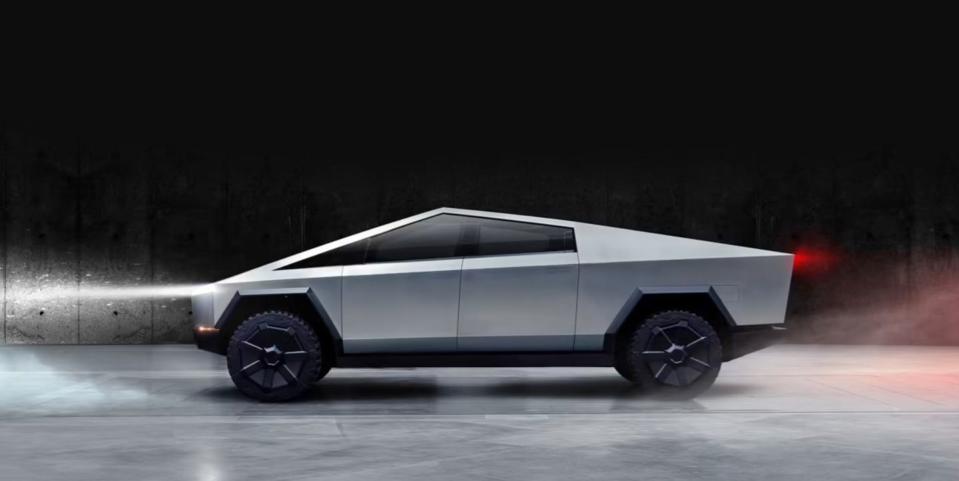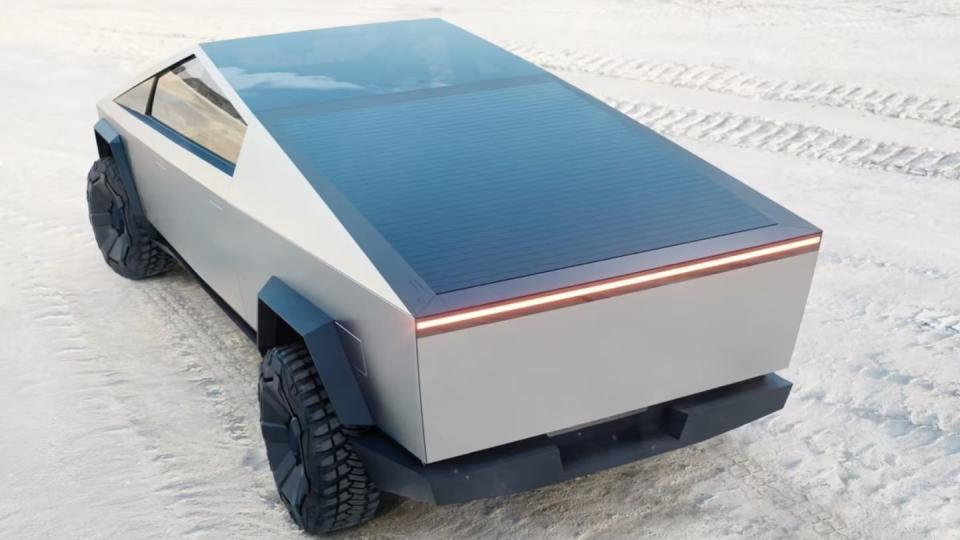Elon Musk Says Tesla Cybertruck Delayed until 2023

Tesla CEO Elon Musk pushes back the start of Cybertruck production to 2023, downplays need for more new models.
The automaker has shelved plans for a $25,000 model, first mentioned during Battery Day 2020 and expected to have been produce in Shanghai.
Elon Musk says Tesla will focus on engineering and development of the Optimus humanoid robot in 2022 and several other vehicle models.
Even before Tesla pushed the planned start of Cybertruck production from the end of 2021 into the second half of 2022, industry observers predicted that the avant-garde pickup may not have a good chance of seeing production this year. Tesla appeared to confirm the launch timeframe shift weeks ago, quietly removing the planned launch date from the Cybertruck page on its site.
Tesla CEO Elon Musk has now confirmed the delayed status of the Cybertruck this week on a call with investors recapping 2021 results, indicating that the model would enter production "hopefully next year," just as the Austin, Texas, plant slated to eventually produce Cybertruck began Model Y production in late 2021.
So a 2023 Cybertruck production start is not quite set in stone either.
The truck, first shown in 2019, had been promised with a $39,990 starting price and a late 2021 launch—a timeframe that had slipped due to the pandemic-related disruptions and a number of other issues. The truck, featuring a stainless steel exterior and a pyramid-style profile, was shown as a prototype on stage in 2019 and has since received a few changes, as speculation grew regarding just how many prototypes Tesla had. A video leaked a week ago showed the exterior of the latest Cybertruck prototype, appearing a bit smaller in person and incorporating a number of minute changes to the design, including some seemingly production-intended items such as side mirrors and a single windshield wiper.
"So we will not be introducing new vehicle models this year, it would not make any sense, because we would still be parts constrained," Musk said on the call. "We will however do a lot of engineering, tooling, what not to create those vehicles, as the Cybertruck, Semi, Roadster, Optimus, and be ready to bring those to production hopefully next year, that is the most likely. That is dependent upon 'are we able to produce more cars, or fewer cars?'"
The Tesla CEO then indicated that the humanoid robot, previewed via a human in a suit months earlier, would be the focus of the company's development efforts in 2022.
"So in terms of priority of products I think the, I think actually the most important product development we're doing this year is actually the Optimus humanoid robot," Musk said. "This, I think, has the potential to be more significant than the vehicle business over time. If you think about the economy, the foundation fo the economy is labor. Capital equipment is distilled labor. So what happens if you actually don't have a labor shortage? I'm not sure what an economy even means at that point. That's what Optimus is about."
In addition to putting the Cybertruck on the back burner, Musk shelved plans for another planned model, telling investors that Tesla was no longer working on a $25,000 car.

Such a model was first mentioned during the automaker's Battery Day in 2020, and expected to be created first and foremost for China, with Tesla going as far as to invite design concepts for the model, expected to be a small hatch or crossover.
"We are not currently working on a $25,000 car," Musk said.
"At some point we will. We have enough on our plate right now. Too much frankly."
The shelving of the $25,000 car likely took very few industry watchers by surprise, given the current chip shortage, and also given just how much of a profit margin such a model could offer Tesla.
There are certainly a number of sub-$25,000 EVs on the market in China, but it has been doubted since that 2020 Battery Day that Tesla would want to work with margins that slim, given the fact the base Model Y now starts at $60,190 in the US. Such a model would also be unlikely to use many existing Model 3/Model Y parts, and would need to be a clean-sheet design as opposed to a deeply decontented Model 3 hatchback. This would add more development costs, which would have to be recouped somehow at a time when Tesla is selling every vehicle it produced anyway after raising prices several times in 2021, as Musk indicated on the call.
Despite the shelving of the $25,000 car and the Cybertruck delay, Tesla has weathered 2021 better than some other automakers, producing 930,422 vehicles and delivering 936,172 vehicles. While the Model S and the Model X experienced some parts-related delays while receiving updates inside and out, including the yoke-style steering, the Model 3 and the Model Y combined accounted for 906,032 vehicles produced and 911,208 vehicles delivered last year—a record result for Tesla.


 Yahoo Autos
Yahoo Autos 